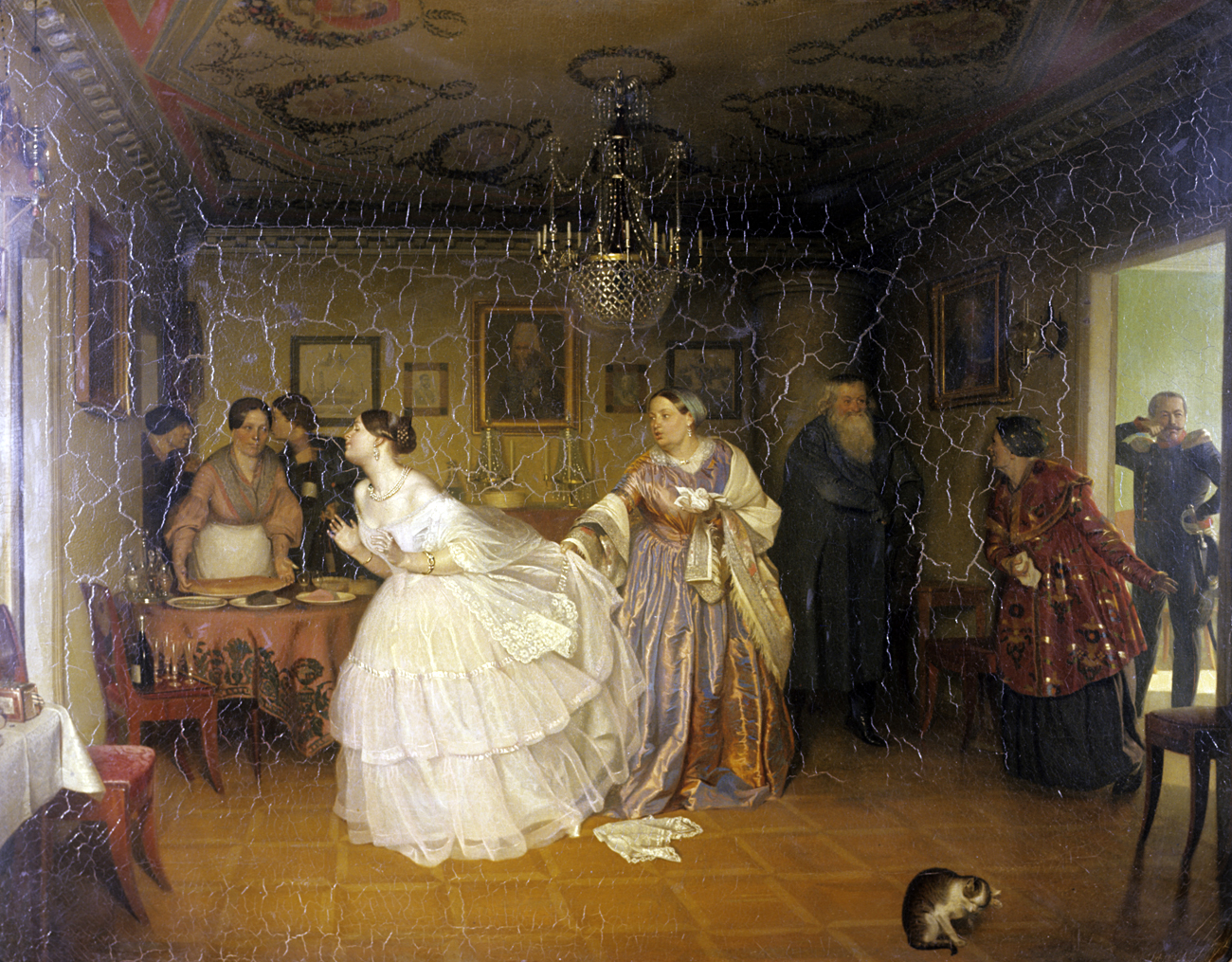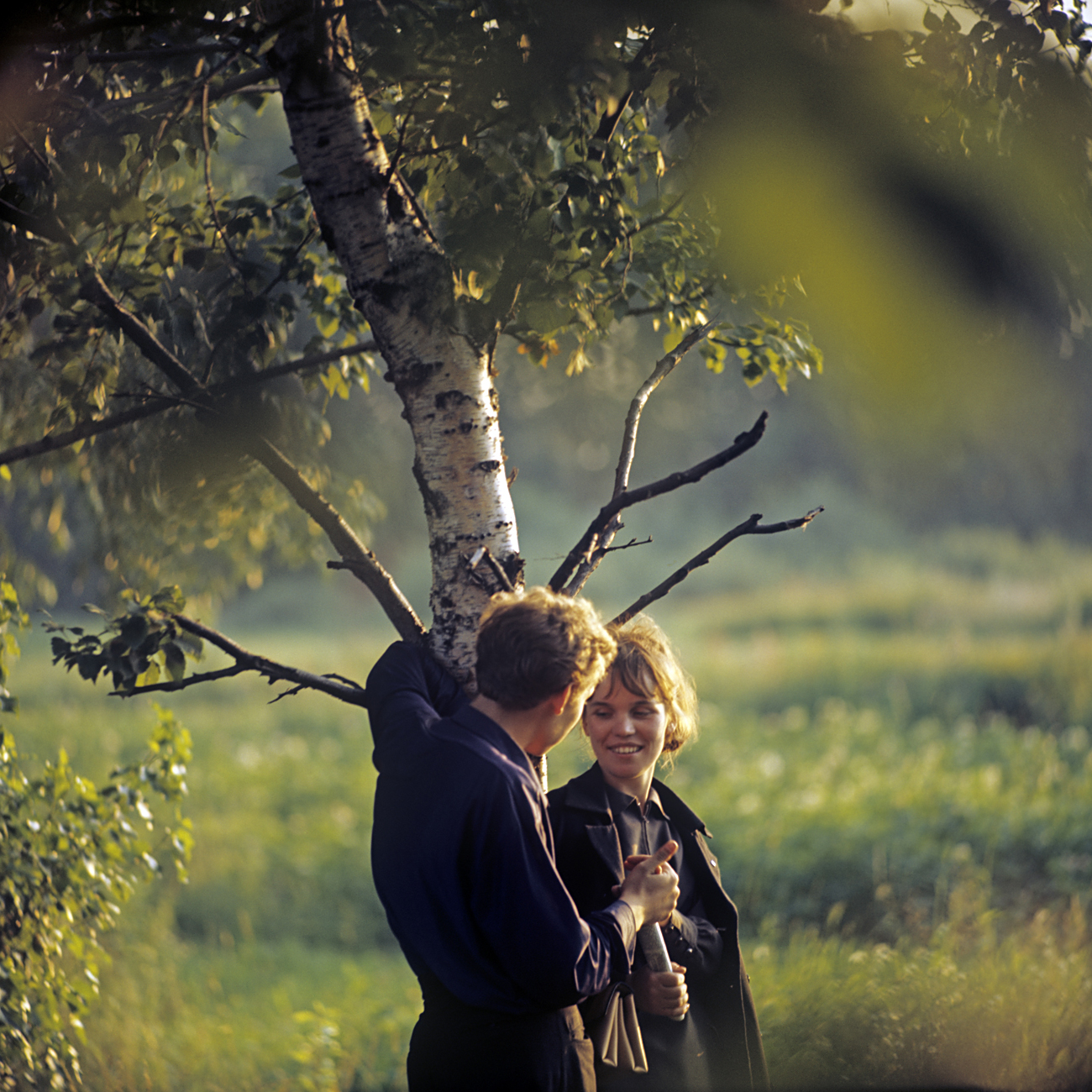
Couples kiss as part of a flash mob in the town of Tyumen on the World Kissing Day, 2012.
Maxim Slutsky/TASSAs in many parts of the world, the process of find a husband or wife in Russia has changed dramatically over time. In early tsarist Russia, a match was arranged by professional marriage brokers; later, newspaper ads became popular. Today, young Russians prefer to log on to an app or sign up for a speed dating session
From the 10th and 11th centuries to the mid-19th century, matchmaking was the most common way to find a life partner in Russia. Between the late 13th and the early 18th century, a marriage contract could be concluded by matchmakers. This rule was abolished by Peter the Great in 1702. The same decree also gave engaged couples more independence. Under the new order, they were allowed to meet within six weeks after their parents had made an agreement. A marriage contract could also be broken if, for example, the bride is "ugly, mournful and unhealthy." On Jan. 16, 1724, forced marriages were banned.
 Pavel Fedotov's The Major Goes A-Wooing. 1848. State Tretyakov Gallery, Moscow / Source: Balabanov/RIA Novosti
Pavel Fedotov's The Major Goes A-Wooing. 1848. State Tretyakov Gallery, Moscow / Source: Balabanov/RIA Novosti
With the rise of urbanization in the 19th century, class boundaries began to fade, and matchmaking was replaced by new ways to find love. At the beginning of the 19th century, it became popular to search for a life partner through newspaper ads. Wedding-themed newspapers and magazines began to appear in 1905.
In an issue of Brachnaya Gazeta (Marriage Newspaper) dated July 28 (15), 1907, a certain Mr. Borisov ran an ad, saying, "I am a democrat. Tired of fighting injustice and evil on my own, and therefore want to find a woman friend-cum-comrade with my outlook on life..."
In the Soviet Union, young people got to know each other mostly through friends or at dances. But there were stories worthy of romantic movies. Olga Bykova says her grandfather Ivan fell in love with her grandmother Liya when he saw her picture in a friend's album. On the back of the picture, Ivan found the girl's address and began to write letters to her.
 A worker of the 'Elektrosila' Electric Machine Building Plant, on a day out in Leningrad suburbs, May 1, 1970. / Source: B.Manushin/RIA Novosti
A worker of the 'Elektrosila' Electric Machine Building Plant, on a day out in Leningrad suburbs, May 1, 1970. / Source: B.Manushin/RIA Novosti
Later he came to visit her in the town of Veliky Ustyug (470 miles northeast of Moscow) from Austria, where he served after World War II. After that meeting, they corresponded for two years before Ivan received a transfer to the Soviet Union and came to marry his beloved. "My grandmother left her fiancé and went with my grandfather to Lviv (a city in western Ukraine), something that she never regretted," Bykova said.
Although today the ancient custom of matchmaking and bride prices still exists in some Russian regions, primarily in the North Caucasus, most modern Russians are embracing modern trends for finding a boyfriend or girlfriend. Mini-dates are one popular approach.
"We are approached by different people, from chefs and students to financial directors," said Yelizaveta Tarasova, head of the 1+1 speed-dating project. "People are attracted by the chance to find their love and the ability to choose."
Mini-dates are rivaled in popularity by dating mobile apps. Badoo and Tinder are the most popular applications in Russia.
Yulia Ivanova from the Urals city of Yekaterinburg (880 miles east of Moscow) installed Tinder on her phone when she learned that the application was being used by her handsome colleague.
"The story of my stay on Tinder has become the search for one person. I brushed aside pleasant young men to find the one who I really needed," Ivanova said. A few weeks later, she did see the familiar face, and the young man accepted her request in the app. "After that, I removed Tinder and decided to continue communication in reality.”
The global popularity of Tinder makes it particularly attractive to Russian women who want to meet foreigners. This is how Anna Lobova from Nizhny Novgorod got acquainted with a man from Australia. "We corresponded for four months and fell in love with each other," she said. "Then he flew to Russia, but in another four days, he realized that he grew cool toward me."
"There were matches with Russian young people in the application, too," Lobova said. "But they either do not write anything, or begin with platitudes. Young people from other countries approach the conversation in more interesting ways; we immediately start talking."
Clinical psychologist and psychotherapist Inna Khamitova, who is the director of the Center for Systemic Family Therapy, believes that the high popularity of dating applications is not a fad, but a realization of the natural human need to find love.
"What's wrong, for example, with matchmaking?" said Khamitova. "A huge number of people found a life partner in such a way at one time. And with the development of technologies, it is not such a bad idea to take advantage of mobile applications for the same purpose. In addition, the registration of a person in such an application is regarded as a declaration of intent, so the chances of rejection are reduced."
All rights reserved by Rossiyskaya Gazeta.
Subscribe
to our newsletter!
Get the week's best stories straight to your inbox